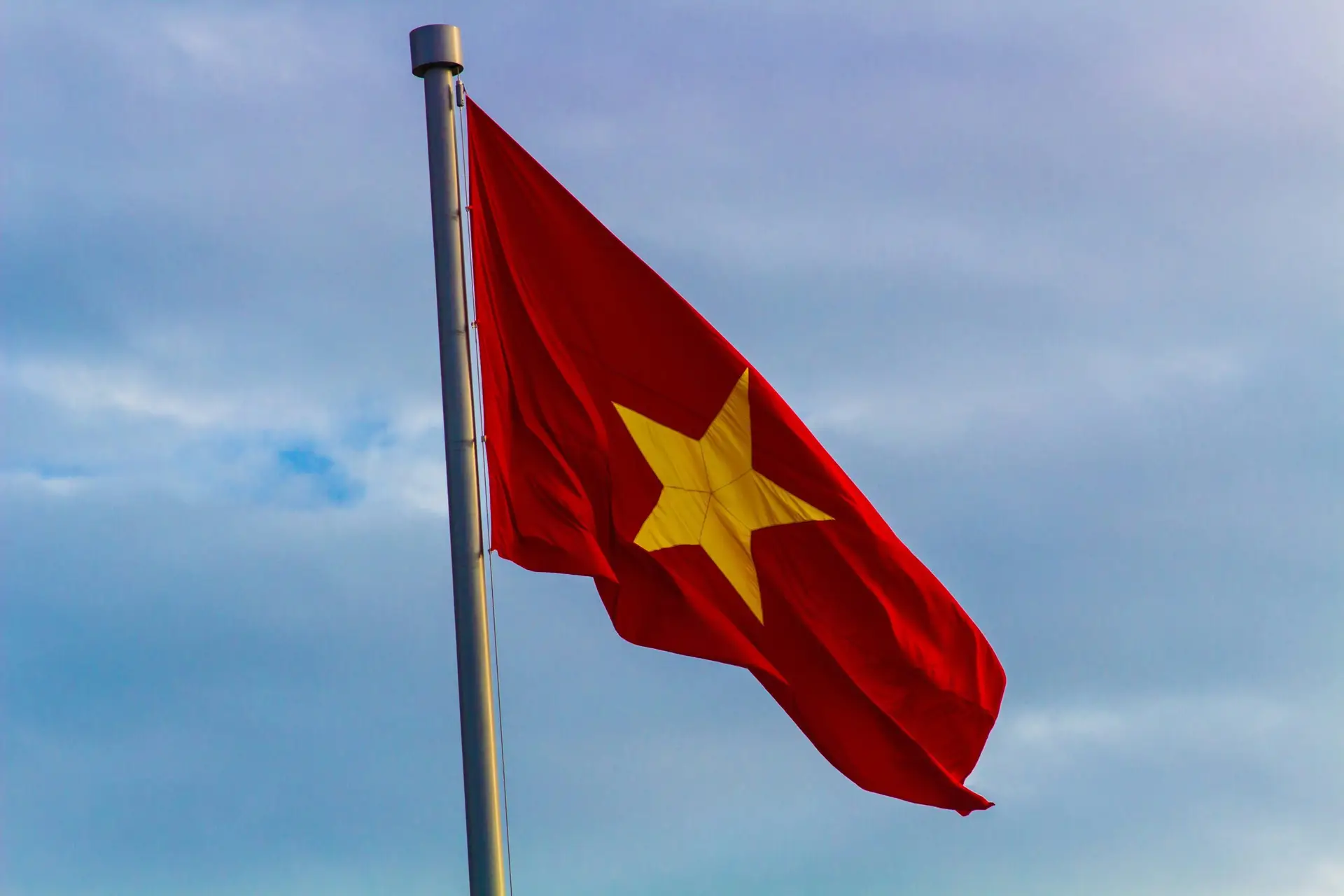
How To Know Vietnamese Music | The Most Popular Genres
Vietnamese music has many genres. Music in Vietnam has native sounds, traditional instruments, and music from other countries. Vietnam is one of the few places
Are you looking for best books about Vietnam War?
The Vietnam War marks a pivotal chapter in modern history. It has etched a complex narrative into our collective consciousness. Each narrative paints a distinct picture of its profound impact.
This period of conflict is known for its complexity and transformative nature. Literature has played a key role in dissecting and examining this era. In this post, we will explore the ’10 Best Books About the Vietnam War.’ This collection goes beyond mere historical recounting, and these books stand as a testament to the power of storytelling.
What makes this list unique?
It includes perspectives from both sides of the conflict. We feature not only American soldiers and authors but also Vietnamese voices. This approach provides a more holistic and nuanced view of the war.
The books cover firsthand accounts of battle-weary soldiers. They also share poignant narratives of civilians caught in the relentless crossfire. These works explore the emotional and psychological landscapes of individuals from diverse backgrounds. Through these authors’ eyes, we witness the universal truths of war’s harshness. We also see the enduring spirit of those who withstand its trials.

Vietnam’s history is marred by centuries of warfare, with its people persistently fighting against foreign dominations to preserve their sovereignty. This resilient nation faced invasions by its colossal neighbor, China, and repelled Mongol incursions in the 13th century. However, it was the French colonial conquest in the mid-19th century that laid the groundwork for modern conflict, as Vietnam became part of French Indochina.
The French rule introduced Western elements into Vietnamese society but also spurred nationalist movements. During World War II, Japan exploited the weakening of French power to occupy Vietnam, yet it was the Viet Minh, a communist-led resistance force under Ho Chi Minh, that capitalized on the Japanese surrender to declare Vietnam’s independence in 1945.
Post-World War II, the French sought to reclaim their former colony, leading to the First Indochina War, culminating in their defeat at Dien Bien Phu in 1954. The Geneva Accords in 1954 that followed temporarily divided Vietnam at the 17th parallel, with Ho Chi Minh’s communists in the North and a pro-Western regime in the South.
The Cold War exacerbated the division, as the U.S. feared a “domino effect” of communism. The North’s formidable army and the covert operations of the Viet Cong in the South threatened to tilt the regional balance, prompting increased U.S. involvement.
The Vietnam War, officially began in the late 1950s and lasted until 1975. It was not only a clash between the communist North and the capitalist South but also a civil war, with families and communities torn apart by differing ideologies.
The U.S. military intervention reached its peak in the late 1960s, with the controversial conflict sparking widespread protest and leaving deep scars on American society. The war was characterized by its length, guerrilla warfare, and the heavy toll on civilians.
Following the withdrawal of U.S. forces and the fall of Saigon in 1975, Vietnam faced the immense task of unifying the country under the Socialist Republic of Vietnam. The subsequent years were challenging, with economic hardships and isolation from much of the international community, though Vietnam eventually embarked on market reforms and opened up to the world.
The legacy of the Vietnam War is complex, with its impact still felt in the distrust and social fractures within Vietnam, as well as in the approach and foreign policy of the United States. Despite this, Vietnam has shown remarkable resilience and growth, transforming from a war-torn nation into an emergent market with an increasingly significant role in Southeast Asia and the world. As the reflection of the real world, the literature also has gradually transformed.
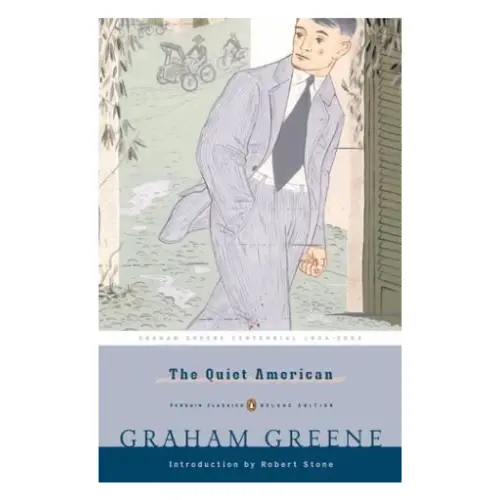
Set in Vietnam in the early 1950s, “The Quiet American” depicts a pivotal era before the outbreak of the Vietnam War. Thomas Fowler, a British journalist currently based in Saigon, narrates the story. Before the height of American engagement in Vietnam, it is lauded not only for its engaging narrative but also for its prescient assessment of American foreign policy in Vietnam.
Greene reflects the real-life blunders of American strategy in the region through his character Pyle. Pyle is a well-intentioned but misguided American. He underestimates the complexities of Vietnamese politics and culture. Fowler, a British journalist, and his Vietnamese girlfriend Phuong become entangled with Pyle. This entanglement forms a love triangle. As Fowler gets more involved in political intrigue, his moral compass is tested. His feelings for Pyle grow, leading to moral complexities. These complexities include love, loyalty, and colonialism.
Additionally, the novel explores moral quandaries. These are faced by individuals in the midst of great power politics. It does so through the lens of personal connections and political intrigue. The work is a timeless examination of war, love, and moral uncertainty. Greene achieves this through subtle characterization and atmospheric descriptions. He paints a picture of a Vietnam on the brink of massive warfare.
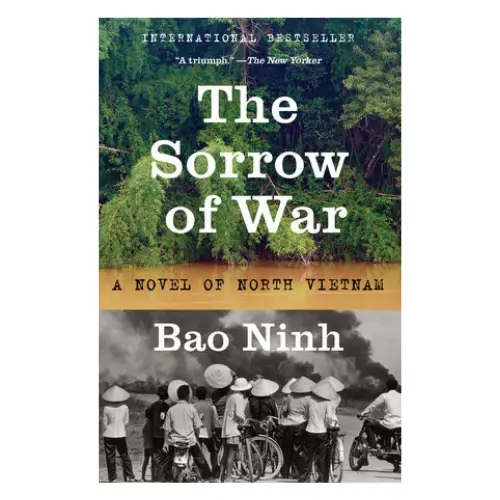
In “The Sorrow of War,” Bao Ninh, a North Vietnamese combat veteran, offers a heartbreaking and introspective account of his experiences throughout the conflict. Kien, a North Vietnamese soldier, is the protagonist of this novel about his life before, during, and after the Vietnam War. His harrowing wartime memories are juxtaposed with his search for solace and purpose in the aftermath of the conflict.
As Kien navigates through his post-war life, the story illustrates the continuing consequences of the war on individuals and society. The wounds, the recollections, and the scars all tell a story of loss and the never-ending quest for healing and resolution. The unique perspective of the North Vietnamese side presented in this book is something rarely seen in Western writing on the Vietnam War. Bao Ninh’s actual experience as a soldier adds a dimension of realism and depth to the narrative. And those made the depiction of war’s brutalities breathtakingly genuine and visceral.
As one of the best books about Vietnam War, it’s unvarnished depiction of the terrible repercussions of war on the human mind is its source of genuine emotional impact. War’s effects on people emotionally and mentally as well as physically are explored. From this vantage point, readers are invited to consider how the suffering and death caused by conflict are not limited by borders of any kind.
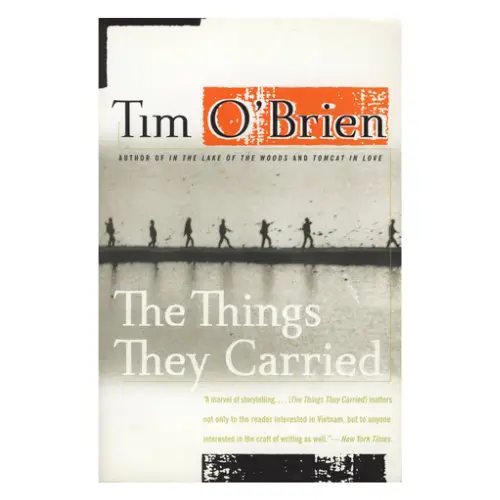
“The Things They Carried,” written by Tim O’Brien, is a powerful and evocative collection of linked short stories that explore the experiences of a platoon of American soldiers during the Vietnam War. The stories, while centered around the platoon’s experiences, are primarily told through the perspective of Lieutenant Jimmy Cross. The narrative delves deep into the lives of these soldiers, exposing not just the physical load of their equipment but also the emotional and psychological burdens they bear.
Each story in the book skillfully interweaves grim war realities with personal reflections. Tim O’Brien creates a tapestry of experiences, ranging from poignant to disturbing. He vividly portrays the soldiers’ fear, guilt, love, and uncertainty. Moreover, he brings to life the tangible weights of their weapons and mementos like letters and photographs.
The narrative goes beyond recounting war acts. It delves deep into the soldiers’ hopes and dreams. It also reflects on the heavy losses and burdens they carry from their experiences. Furthermore, the book’s uniqueness lies in its portrayal of war’s inexpressible aspects. These include the mixed feelings of fear, courage, confusion, and camaraderie among soldiers. Additionally, O’Brien’s use of metafiction and self-reflection enhances the book’s impact. It invites readers to engage on a personal level. They ponder the implications of war on individual lives and the collective human psyche.
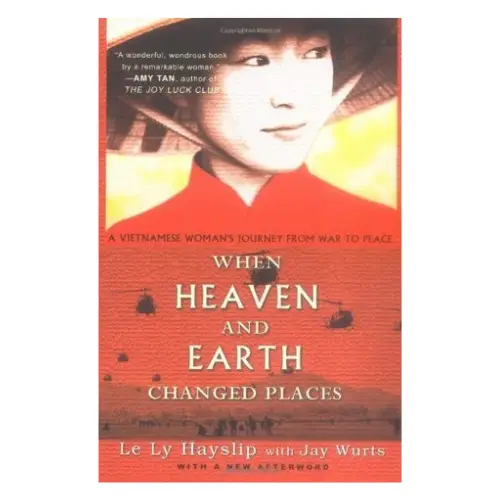
“When Heaven and Earth Changed Places” is a moving and deeply personal memoir by Le Ly Hayslip that chronicles her life in Vietnam during one of the most tumultuous periods in its history. Beginning with her childhood in a small village in central Vietnam, the book captures the innocence of her early years, which is shattered by the outbreak of the Vietnam War.
As the war escalates, Le Ly’s life is drastically changed. The narrative vividly recounts her experiences, including constant fear of bombings and the loss of loved ones. It also shows the devastating impact of the conflict on her community. Amidst this chaos, her family’s survival showcases their resilience and resourcefulness. However, the war brings personal tragedies and hard choices for Le Ly. She faces unimaginable hardships, often caught between opposing sides.
This book stands out for its candid and heartfelt portrayal of the Vietnam War from a Vietnamese civilian’s view. Unlike many war narratives focusing on military and political aspects, this memoir offers an intimate glimpse into the daily life of the Vietnamese people during this time. Moreover, as one of the best books about the Vietnam War, it tells a compelling story of personal growth and transformation. Le Ly’s journey from a war-torn country to the United States is both a physical and an emotional odyssey. Her story highlights the complexities of identity and belonging as she navigates two vastly different worlds and cultures.
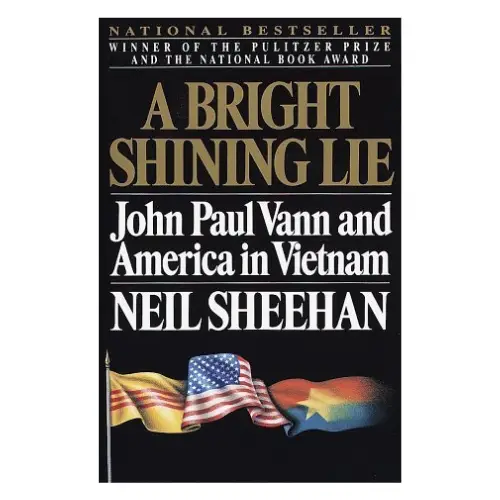
“A Bright Shining Lie: John Paul Vann and America in Vietnam” is a comprehensive biographical account of John Paul Vann, a U.S. Army officer and later a civilian official in Vietnam, whose life story encapsulates the complexities and contradictions of the United States’ involvement in Vietnam.
The narrative follows Vann’s career, starting with his arrival in Vietnam in the early 1960s. He was a senior military advisor then. His journey ends with his untimely death in a helicopter crash in 1972. Initially, the book uses Vann’s life to explore the Vietnam War’s broader themes. These include military strategies, political decisions, and moral ambiguities. Vann is a complex figure in Sheehan’s narrative. He’s both a charismatic leader and a deeply flawed individual.
Furthermore, the book stands out in how it humanizes the Vietnam War. It does so through Vann’s personal story. Sheehan uses Vann’s experiences to delve into larger issues. These include political arrogance, military hubris, and the moral complexities of war. Consequently, the narrative is rich in detail. It provides readers with a nuanced understanding of the war’s dynamics. This includes both the American and Vietnamese perspectives.
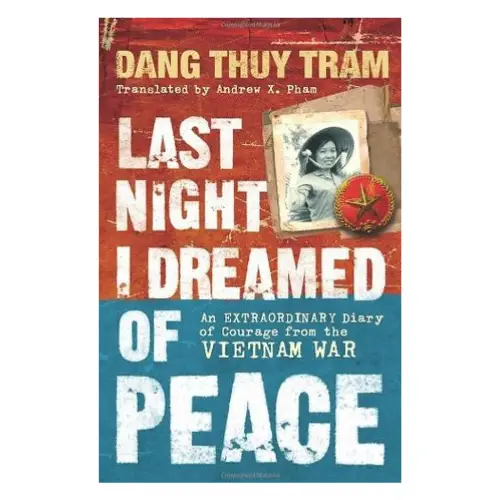
A deeply moving and personal account of the Vietnam War as seen through the eyes of a young North Vietnamese doctor, “Last Night I Dreamed of Peace: The Diary of Dang Thuy Tram” is a must-read when it comes to best books about Vietnam War. This diary, which begins in 1968 and continues until her death in 1970, provides a unique and intimate look at the war from a civilian’s perspective. Throughout her diary, Dang Thuy Tram writes with heartfelt emotion about her experiences treating troops and civilians wounded in the war. Her letters highlight the day-to-day hardships of working in a war-torn environment, from the lack of medical supplies to the constant fear of bombings and the heart-wrenching sight of pain and death.
The diary stands out as one of the best books about the Vietnam War. It offers a glimpse into Dang Thuy Tram’s psyche and chronicles her medical work. The diary reveals her deep thoughts and feelings about the war, love, and her existence. She describes her struggles in balancing professional duties with personal desires. These include sexual and familial yearnings. Clearly, Dang Thuy Tram’s thoughts transcend the specifics of the conflict. They touch on universal themes like humanity, compassion, and perseverance.
Moreover, insights into the Vietnam War from a civilian and female perspective are rare in historical records. Dang Thuy Tram’s journal provides exactly how her heartfelt prose humanizes the conflict. It reveals the emotional and psychological toll on those enduring it. Through her writing’s immediacy and honesty, you can sense Dang Thuy Tram’s bravery, vulnerability, and unwavering dedication to her patients and country.
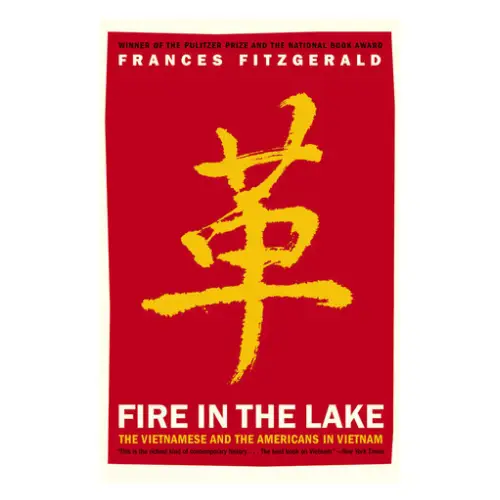
“Fire in the Lake: The Vietnamese and the Americans in Vietnam” by Frances FitzGerald is a profound non-fiction work that digs into the various cultural, political, and historical aspects that contributed to the Vietnam War and profoundly influenced its end. FitzGerald’s story begins with an in-depth analysis of Vietnamese history and culture, which provides a groundwork for understanding the country’s centuries-old customs, social structures, and the deeply ingrained nationalistic sentiment that significantly influenced Vietnam’s reaction to foreign intervention.
The author first discusses the conflict’s roots in the French colonial era. She then explores the rise of Vietnamese nationalism. FitzGerald delves into the ideological and political factors that led to the Vietnam War. She examines the bifurcation and the growing American involvement. Additionally, she deeply analyzes the strategic choices of the United States and Vietnam. She highlights how cultural misunderstandings and ideological differences fueled the war’s escalation.
What sets it apart? Frances FitzGerald’s in-depth familiarity with Vietnamese history and culture serves as a lens through which she examines the Vietnam War from multiple angles, making “Fire in the Lake” an exceptional work. Her perspective, which goes beyond traditional military and political accounts, is distinguished by its ability to draw connections between the war’s actions and their historical and cultural backdrops.
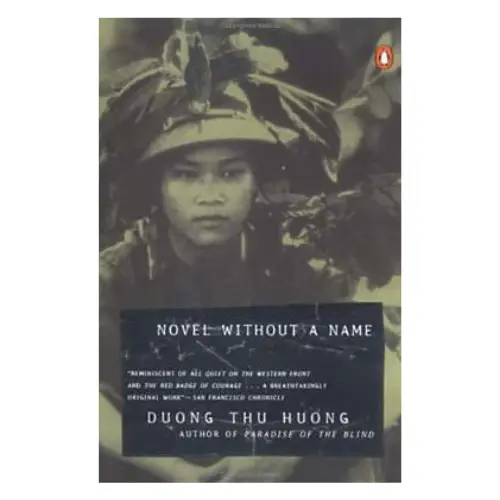
“Novel without a Name” by Duong Thu Huong offers a gripping and introspective look into the Vietnam War through the eyes of Quan, a young North Vietnamese soldier. The novel starts with Quan’s idealistic and fervent commitment to the cause of his country’s unification. But as the narrative unfolds, his initial enthusiasm gradually dissipates into disillusionment and despair. As Quan witnesses his fellow soldiers’ and civilians’ suffering, he faces personal losses and traumas. These experiences lead him to question the war’s purpose and cost. Moreover, his internal struggle mirrors the disillusionment felt by many in the prolonged conflict.
This novel ranks among the best books about the Vietnam War for its candid portrayal. It challenges the simplistic narratives common in propaganda and media. The novel gives a human face to North Vietnamese soldiers, often seen as pawns in geopolitical games. Furthermore, it explores their hopes, fears, and disillusionments. The book’s focus on the psychological impact of the war is especially groundbreaking. This perspective was rare at the time of its publication.
In short, as one of the best books about Vietnam war, this one offers a poignant and powerful narrative. It tells a soldier’s story and reflects a nation’s turbulent history. This narrative sheds light on the experiences of its people during a critical period.
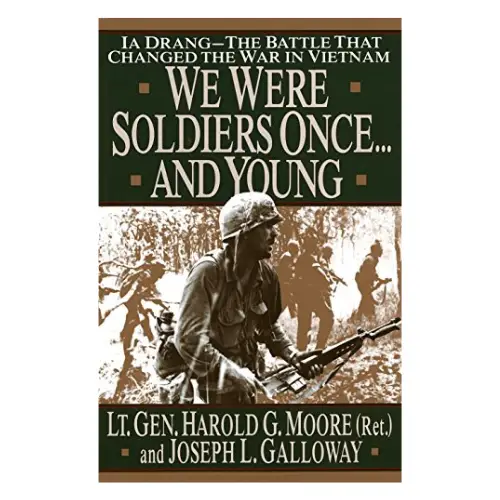
“We Were Soldiers Once… and Young” is a compelling first-person account of the Battle of Ia Drang, one of the early and most critical battles of the Vietnam War. This was one of the first significant battles between the United States Army and the People’s Army of Vietnam, and the narrative places you right in the thick of the action. It describes the lead-up to the battle, the fighting itself, and its aftermath, shedding light on the strategic choices made and the chaotic, violent realities of ground combat. Intense fighting typified the Battle of Ia Drang, and the book portrays the bravery, dread, and fortitude of the soldiers who fought there.
This book is among the best on the Vietnam War. It presents a vivid picture of the conflict through detailed descriptions, personal anecdotes, and first-hand testimonies. These accounts come from soldiers on both sides. The book tells the story of young soldiers airlifted into the Ia Drang valley. It describes their struggles against a formidable enemy in a foreign and dangerous environment. Besides detailing combat events, the narrative explains the conflict’s escalation and its impact on U.S. military strategy.
Compared to other Vietnam War works, ‘We Were Soldiers Once… and Young’ is unique. It offers an incredibly detailed and accurate depiction of combat. This detail gives readers a real sense of being on the ground during a major battle. Furthermore, Lt. Gen. Harold G. Moore, a co-author, commanded U.S. forces in the conflict. His involvement lends credibility to the book. Moore’s account highlights the challenges of being a combat commander. It also provides valuable tactical insights.
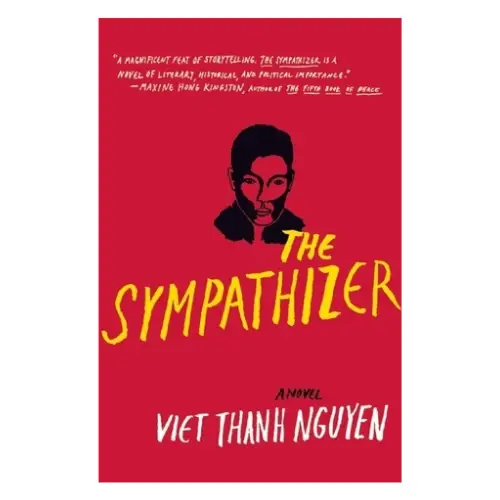
In “The Sympathizer,” Viet Thanh Nguyen depicts the complicated lives of a communist spy who is half French and half Vietnamese, making for a compelling and thought-provoking read. The protagonist, a nameless South Vietnamese army captain, is a Viet Cong mole who has infiltrated the government and military at the highest levels. His adventure begins in the waning days of the Vietnam War, as Saigon falls, and he is tasked with leading a group of South Vietnamese refugees to safety in the United States.
The protagonist leaves Vietnam and settles in Los Angeles, where he mixes in with the Vietnamese immigrant population while still reporting back to his communist superiors there. The novel does a fantastic job of conveying his emotional agony and conflicted loyalties as he struggles to choose between his communist principles, his connections with those he is betraying, and his complex identity as a Vietnamese-Western hybrid. And the novel really gets into what it’s like to be an immigrant, showing how hard it is to adjust and how it feels to live in a limbo between two cultures. The protagonist’s dual background and his work as a spy metaphorically mirror the greater experience of many people who find themselves maneuvering between different cultures and ideas.
As one of the best books about Vietnam War, “The Sympathizer” is lauded not only for its captivating tale, but also for the thoughtful and nuanced ways in which it explores the underrepresented parts of the Vietnamese experience in the United States and the enduring effects of colonialism and war. It’s a compelling story that makes readers question their assumptions about loyalty, individuality, and peacebuilding.
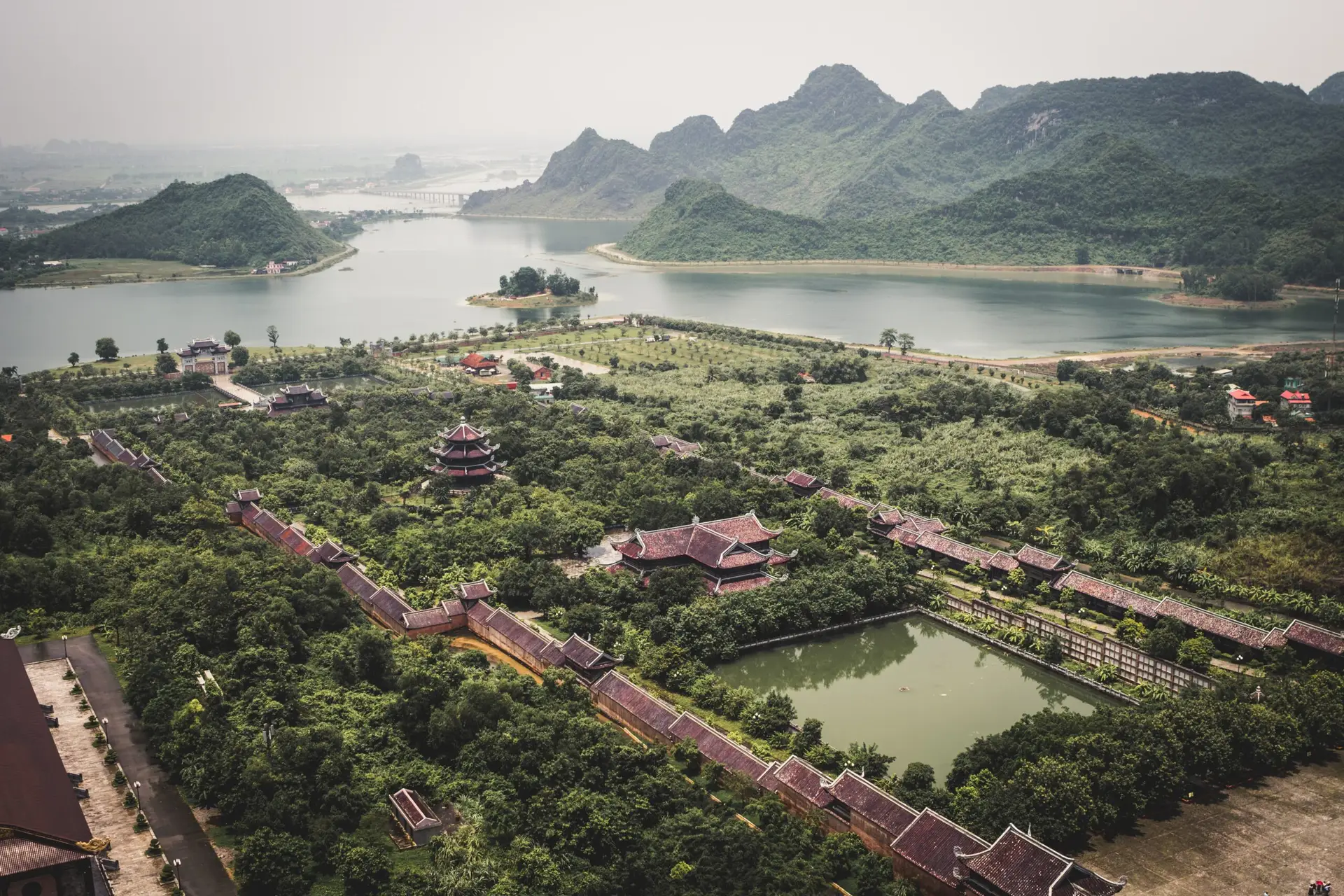
The Vietnam War, with its intricate blend of political, social, and personal turmoil, has not only shaped history but has also inspired a rich tapestry of literature that transcends time. The ten books discussed in this article provide more than mere historical accounts; they serve as windows into the souls of those who lived, fought, and endured the complexities of a war that has left an indelible mark on human history. Each narrative, with its unique voice and perspective, contributes significantly to a deeper understanding of the Vietnam War. These works collectively paint a vivid picture of the courage, despair, hope, and relentless spirit of the people involved, bringing to life the realities of a conflict that continues to resonate with us today.
As we turn the last page of these narratives, we are reminded not only of the past but also of the ongoing journey towards healing and understanding in the aftermath of war. These stories underscore the resilience of the human spirit in the face of adversity and the importance of remembering and learning from history. They remind us that while the Vietnam War may be a closed chapter in history books, its lessons and memories continue to echo, urging us to pursue a future where empathy and understanding triumph over conflict and division.
Do you want global book, music, and movie recommendations straight to your inbox?
Sign up for the newsletter below!

Vietnamese music has many genres. Music in Vietnam has native sounds, traditional instruments, and music from other countries. Vietnam is one of the few places

Where are the best Vietnamese Souvenirs? When you are visiting Vietnam or just looking for recommendations, maybe you wondered about what to buy in Vietnam?

Here is a list of 10 of the best Vietnamese books & writers to read if you want to immerse yourself in Vietnamese culture. The
